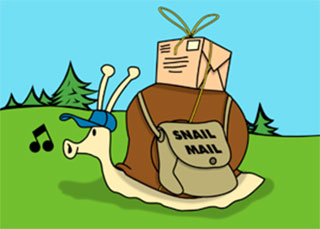
Word of the Day: Pernicious
Pernicious: Word of the Day
Today’s word of the day, thanks to www.wordthink.com, is pernicious. It is an adjective meaning “Having a harmful effect, particularly in a gradual or subtle way.” According to www.dictionary.com, pernicious has three definitions: “causing insidious harm or ruin; ruinous; injurious,” “deadly; fatal,” and “evil; wicked,” though it calls that last definition “Obsolete.”
According to www.etymonline.com, the word entered the English language in the “early 15c., from Middle French pernicious (13c., Modern French pernicieux) and directly from Latin perniciosus ‘destructive,’ from pernicies ‘destruction, death, ruin,’ from per ‘completely’ (see per) + necis ‘violent death, murder,’ related to necare ‘to kill,’ nocere ‘to hurt, injure, harm,’ noxa ‘harm, injury’ (from PIE root *nek-(1) ‘death’).” By the way, the word noxious comes from the same Indo-European root.
On this date in 1981, the cost of a first-class US postage stamp rose from 15 cents, which it had been since 1978, to 18 cents. That was a 20% increase in one fell swoop.
I guess you could say that a 20% increase like that could only happen within the realm of a government monopoly, which first-class mail is in the USA. It was a harbinger of things to come. Initially, the USPS printed a bunch of stamps with the letter B on it because they were not sure whether they would raise the rate of a first-class stamp to 18 cents or to 20 cents. Later in 1981, the USPS announced that it would raise the rate again to 20 cents, so it was probably a good thing that it didn’t print a lot of 18 cent stamps.
According to a New York Times article of October 1, 1981, “The Postal Service said the increase, the second this year, would bring in $1 billion in additional revenue the first year and would permit the service to break even for the 1982 fiscal year, which begins tomorrow. The service estimated its losses for the current fiscal year at $600 million.” The increase did improve things for 1982, but by 1986 the USPS was running at a deficit again.
Rate increases followed. In 1985 it went to 22 cents; 1988 to 25; 1991 to 29; 1995 to 32; and more recently, 2014 to 49; 2018 to 50, and 2019 to 55, where it sits now. And the increase is a real increase, not just a reflection of inflation through the years. 15 cents in 1981 would be 43 cents today, not 55 cents. That is an increase of 30% in constant dollars. And the increase in price is made even more shocking by the fact that fewer and fewer people actually us first-class mail—people email instead of sending letters, they bank on-line, and they even submit job applications and resumes electronically.
The law of supply and demand says that when the demand for a product or service decreases, if the supply stays constant, the price will come down. But apparently the USPS doesn’t believe in the law of supply and demand. As a result, fewer and fewer people use first-class mail—when we’re on vacation, we no longer send postcards because we can take our own photographs and text them immediately to our friends and loved ones. Between 2007 and 2019, the USPS has lost over $75 billion. This despite the ever-increasing costs of using snail mail.
At the same time, companies like Amazon, Sam’s Club, and many more are offering free shipping. Indeed, Amazon, which used to send out products using USPS and UPS (the United Parcel Service), now has its own delivery trucks.
Is there a lesson to be learned from this? I think there is, and I think it is that monopolies are not the powerful forces that many believe them to be. If a company has a monopoly, it tends to lack innovation. And while there may not be a direct competitor to the monopoly, consumers will find ways around the monopoly. Monopolies are inefficient and, more often than not, ineffective, and they frequently rely on government support in order to stay a monopoly.
And as bad as a monopoly can be in the marketplace, a government monopoly is even more pernicious.
The cartoon is from https://www.efulfillmentservice.com/2017/04/is-fedex-smartpost-too-slow/.